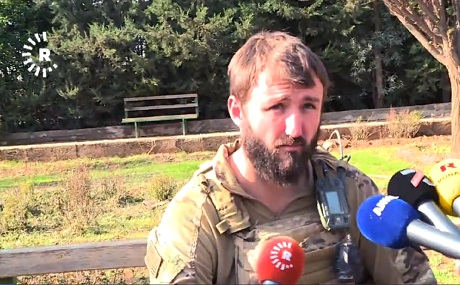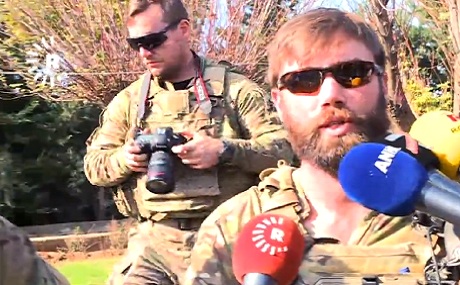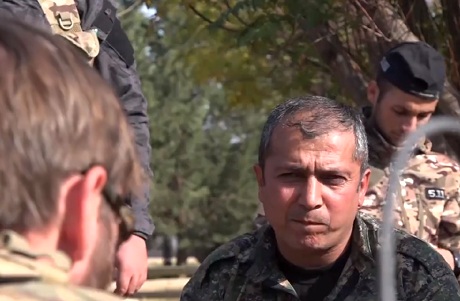ERBIL, Kurdistan Region – US troops supporting the Syrian Democratic Forces (SDF) in operations against ISIS visited villages near the Syria-Turkey border on Sunday to reassure locals they would be protected after Turkish shelling in the area.
The delegation of coalition troops and SDF commanders visited Amude, Dirbesiye, and Serekaniye in northern Hasaka province to examine the situation.
“We’re here to get an assessment of what’s going on on the border. We’re trying to figure out exactly what’s going on, make sure that the civilians see that we’re out here to help,” one US soldier, who refused to give his name and rank, told reporters in Tel Habash, a village in northern Hasaka province.
“We’re just fighters out here trying to do our best to protect the people and then let everything else handle itself.”

Turkish forces recently shelled positions along Syria’s northern border controlled by the Peoples’ Protection Units (YPG) – a Kurdish force that makes up the backbone of the US-backed SDF – considered a terrorist organization by Ankara.
In response to the shelling, the SDF halted its operation against ISIS remnants in Hajin, Deir ez-Zor province, near the Iraqi border.
The US urged Turkey to stop targeting its SDF allies. Turkey agreed, allowing anti-ISIS operations to resume, but urged the US to recognize the YPG and its political wing, the Democratic Union Party (PYD), as terrorist organizations.
American and Turkish forces recently began join patrols in the Manbij area.
“Right now, the way forward, it’s political. There’s no amount of patrols or effort on our part that are going to solve the problem,” another US soldier, who also refused to give his name and rank, told reporters.
“We’re just here to find out what the issues are on the ground and then represent that to our decision makers so that they can develop a way forward and make compromises with our counterparts on all sides,” he said, without explicitly mentioning Turkey.
“The political process, diplomacy, it always takes time, but it’s worth it. What’s not worth it is another drawn out, destructive conflict that’s not good for anybody. So regardless of how long it takes – it’s worth it.”
 US soldier speaks to media in Tel Habash, northern Hasaka, Syria, November 18, 2018. Photo: Rudaw video
US soldier speaks to media in Tel Habash, northern Hasaka, Syria, November 18, 2018. Photo: Rudaw video
The American forces said they are confident the war with ISIS will be won soon, and that US-allies will not be abandoned once the group is defeated.
“I think the campaign is in its final stages to defeat ISIS and that’s why we’re here. Our mission, our charter, is to defeat ISIS – but to do it responsibly so that when we leave there’s not just going to be chaos that ensues or insurgency,” the same US soldier said.
“That’s what we’re here to do and once we feel that’s complete and our partners are taken care of, then it will be time to step back. But we’re not there yet. We still have work to do.”
SDF commander Rubar Derik, who accompanied the delegation, said the presence of coalition forces on the Syrian-Turkish border will help stabilize the security situation.
“A delegation from the international coalition came to Amude, Dirbesiye and Serekaniye regions based on the threats to Rojava in Kurdistan and northern Syria,” said Derik.
“The international coalition and the SDF have made a plan where Turkish threats to northern Syria and Rojava of Kurdistan will be stopped or patrols will be conducted on this line.”

Turkish forces and their Syrian opposition proxies took over the northwest Syrian canton of Afrin in March this year to force the YPG back from its border.
Ankara has repeatedly threatened to send its forces east to take over Kurdish-controlled areas east of the Euphrates River Valley, where US-led coaliton forces are based.
The delegation of coalition troops and SDF commanders visited Amude, Dirbesiye, and Serekaniye in northern Hasaka province to examine the situation.
“We’re here to get an assessment of what’s going on on the border. We’re trying to figure out exactly what’s going on, make sure that the civilians see that we’re out here to help,” one US soldier, who refused to give his name and rank, told reporters in Tel Habash, a village in northern Hasaka province.
“We’re just fighters out here trying to do our best to protect the people and then let everything else handle itself.”

US soldier speaks to media in Tel Habash, northern Hasaka, Syria, November 18, 2018. Photo: Rudaw video
Turkish forces recently shelled positions along Syria’s northern border controlled by the Peoples’ Protection Units (YPG) – a Kurdish force that makes up the backbone of the US-backed SDF – considered a terrorist organization by Ankara.
In response to the shelling, the SDF halted its operation against ISIS remnants in Hajin, Deir ez-Zor province, near the Iraqi border.
The US urged Turkey to stop targeting its SDF allies. Turkey agreed, allowing anti-ISIS operations to resume, but urged the US to recognize the YPG and its political wing, the Democratic Union Party (PYD), as terrorist organizations.
American and Turkish forces recently began join patrols in the Manbij area.
“Right now, the way forward, it’s political. There’s no amount of patrols or effort on our part that are going to solve the problem,” another US soldier, who also refused to give his name and rank, told reporters.
“We’re just here to find out what the issues are on the ground and then represent that to our decision makers so that they can develop a way forward and make compromises with our counterparts on all sides,” he said, without explicitly mentioning Turkey.
“The political process, diplomacy, it always takes time, but it’s worth it. What’s not worth it is another drawn out, destructive conflict that’s not good for anybody. So regardless of how long it takes – it’s worth it.”
 US soldier speaks to media in Tel Habash, northern Hasaka, Syria, November 18, 2018. Photo: Rudaw video
US soldier speaks to media in Tel Habash, northern Hasaka, Syria, November 18, 2018. Photo: Rudaw videoThe American forces said they are confident the war with ISIS will be won soon, and that US-allies will not be abandoned once the group is defeated.
“I think the campaign is in its final stages to defeat ISIS and that’s why we’re here. Our mission, our charter, is to defeat ISIS – but to do it responsibly so that when we leave there’s not just going to be chaos that ensues or insurgency,” the same US soldier said.
“That’s what we’re here to do and once we feel that’s complete and our partners are taken care of, then it will be time to step back. But we’re not there yet. We still have work to do.”
SDF commander Rubar Derik, who accompanied the delegation, said the presence of coalition forces on the Syrian-Turkish border will help stabilize the security situation.
“A delegation from the international coalition came to Amude, Dirbesiye and Serekaniye regions based on the threats to Rojava in Kurdistan and northern Syria,” said Derik.
“The international coalition and the SDF have made a plan where Turkish threats to northern Syria and Rojava of Kurdistan will be stopped or patrols will be conducted on this line.”

SDF commander Rubar Derik speaks with US forces in Tel Habash, northern Hasaka, Syria, November 18, 2018. Photo: Rudaw video
Turkish forces and their Syrian opposition proxies took over the northwest Syrian canton of Afrin in March this year to force the YPG back from its border.
Ankara has repeatedly threatened to send its forces east to take over Kurdish-controlled areas east of the Euphrates River Valley, where US-led coaliton forces are based.




Comments
Rudaw moderates all comments submitted on our website. We welcome comments which are relevant to the article and encourage further discussion about the issues that matter to you. We also welcome constructive criticism about Rudaw.
To be approved for publication, however, your comments must meet our community guidelines.
We will not tolerate the following: profanity, threats, personal attacks, vulgarity, abuse (such as sexism, racism, homophobia or xenophobia), or commercial or personal promotion.
Comments that do not meet our guidelines will be rejected. Comments are not edited – they are either approved or rejected.
Post a comment